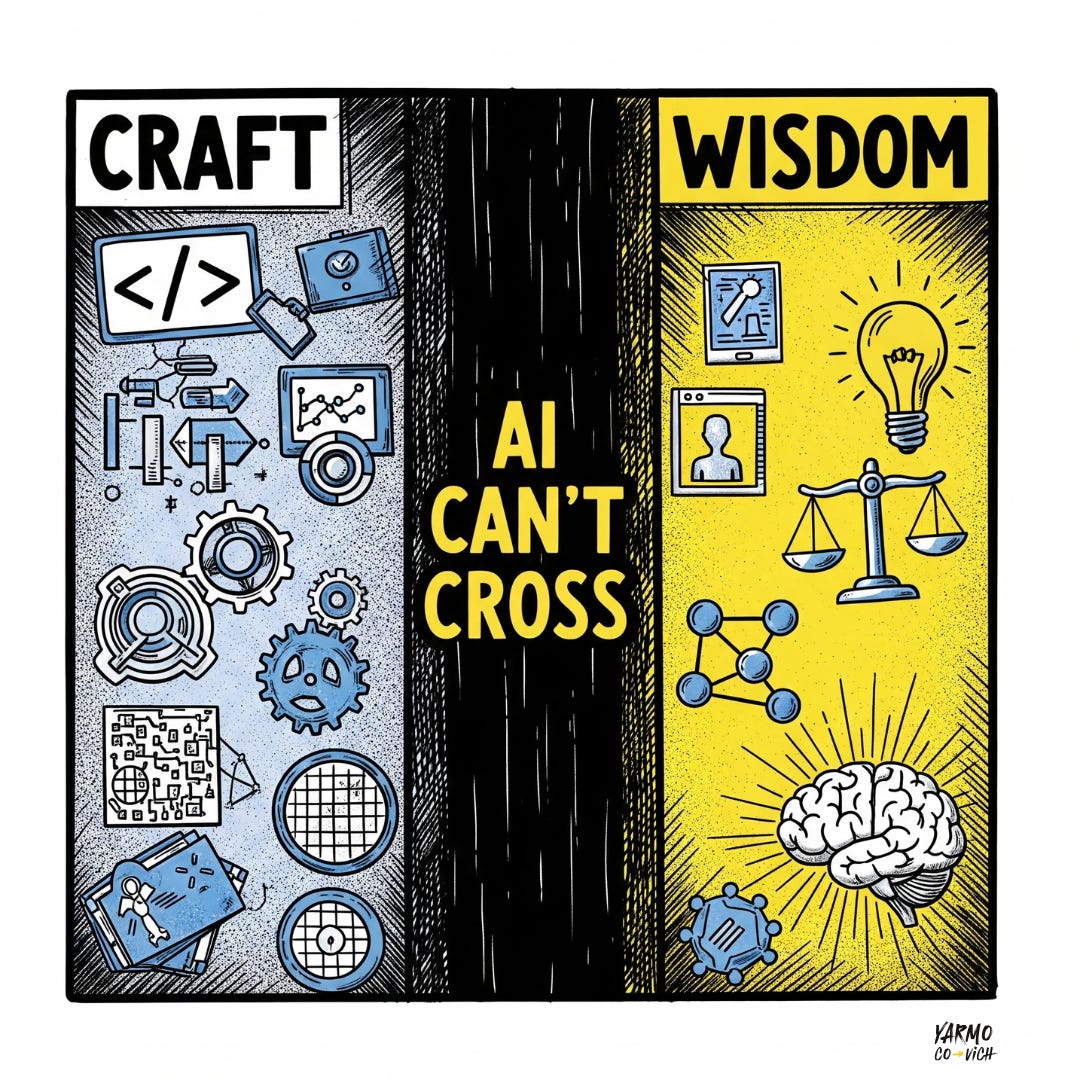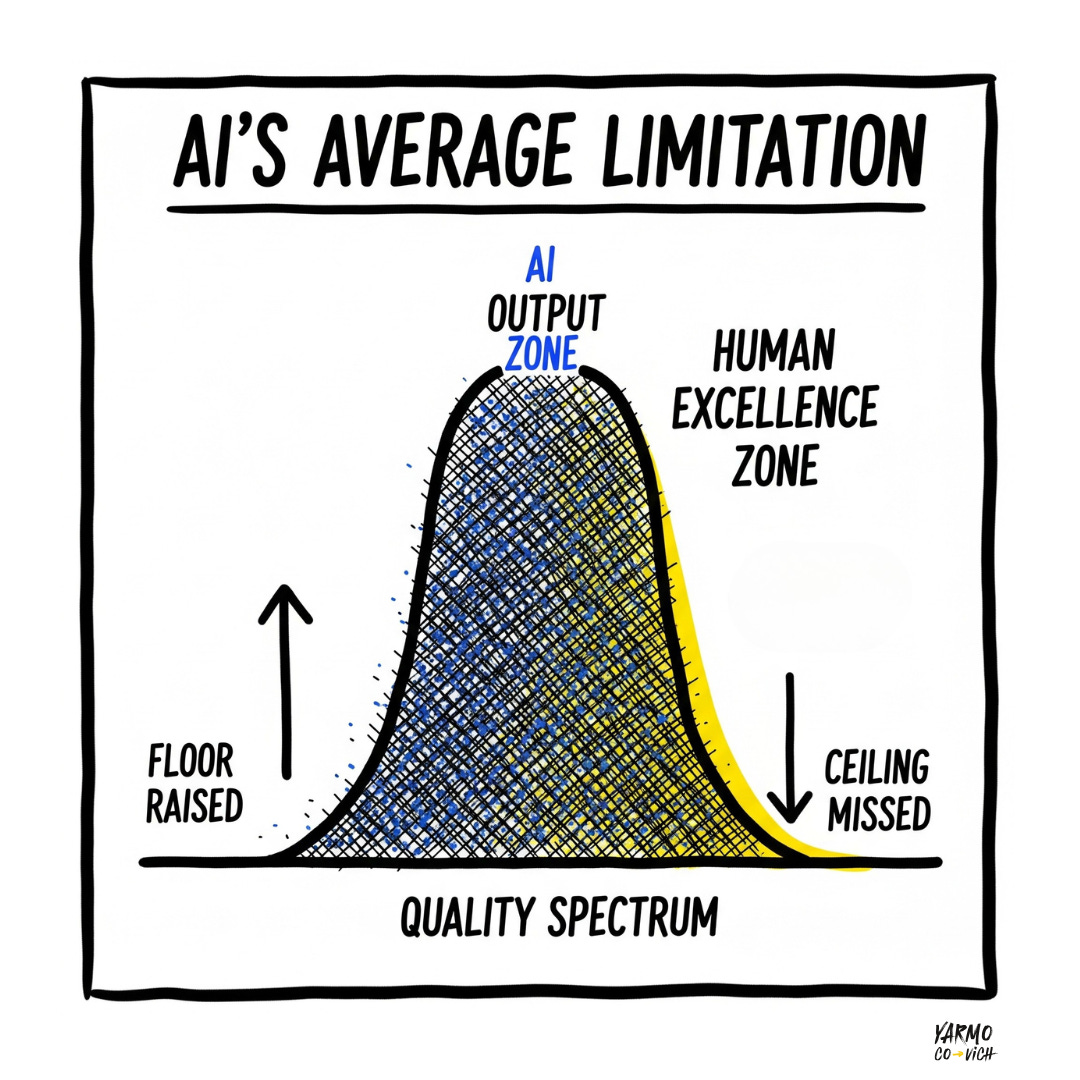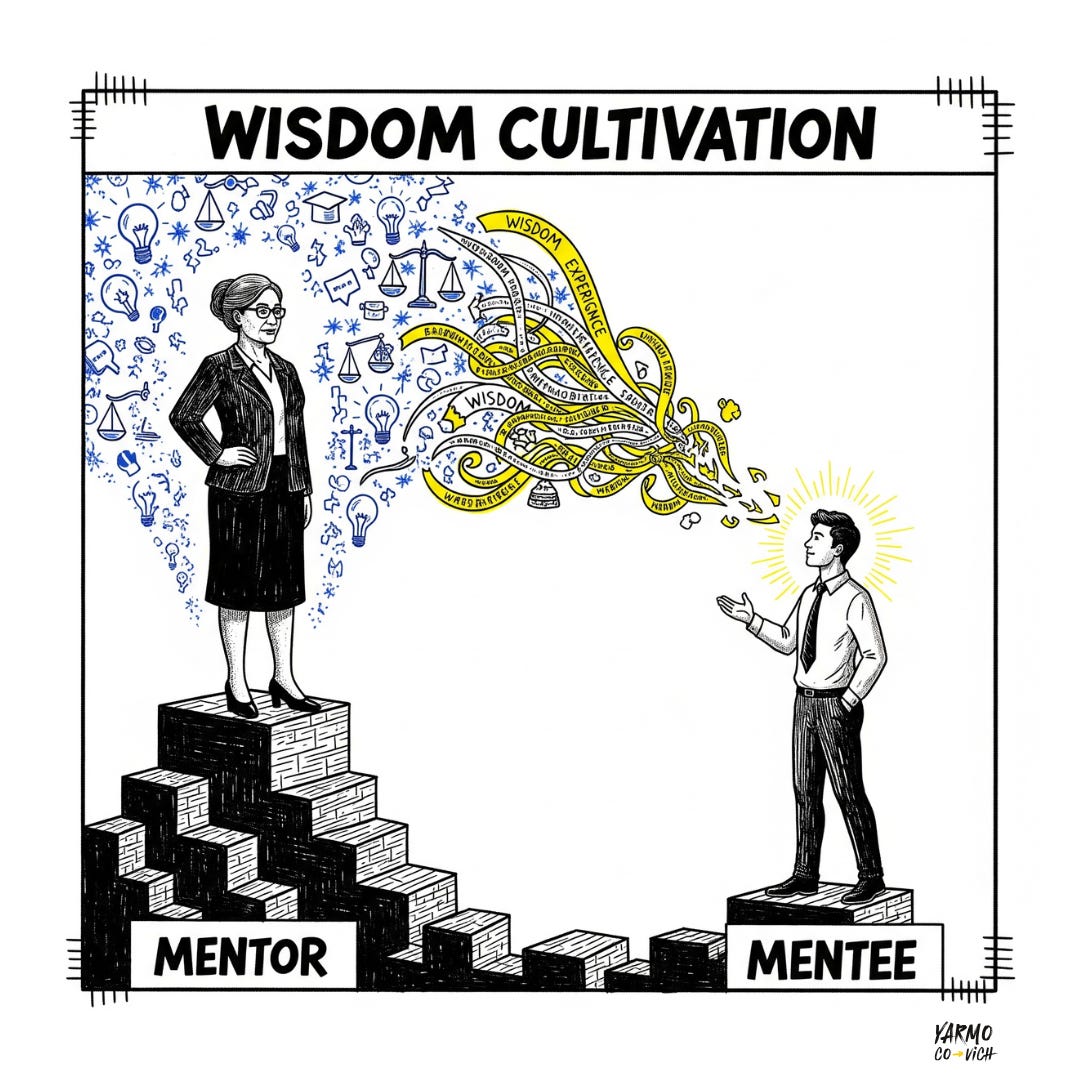This is Part 3 of a 4-part series exploring how CEE software agencies can thrive as AI transforms our industry. The insights presented here were developed through collaborative exploration sessions with Calin Muresan in March-April 2025, examining potential futures for software services in an AI-dominant landscape.
TL;DR: While AI masters technical craft, human wisdom from experience remains irreplaceable. Agencies must cultivate critical thinking, creativity, and judgment through mentorship and deliberate practice to stay above average in an AI-saturated market.
I met Mike Dewis, an accomplished opera soloist, who said something that stopped me in my tracks: "Opera remains one of the purest performances left. There's no technology standing between the singer and audience. You can only rely on your craft."
As we talked, Mike explained how he relies on both his craft from thousands of hours of practice and his artistry from lived experience. "The craft gets me to competent," he said. "The artistry makes it memorable."
That conversation crystallized something about the nature of human expertise in the AI era. The distinction between what AI can learn from training data and what humans develop through experience suddenly made sense. This distinction between craft and wisdom holds the key to our future in an AI-augmented world.

The Craft and Wisdom Distinction
Mike's insight revealed a powerful framework that applies directly to software development. AI rapidly masters craft - syntax, patterns, best practices, the technical skills. But wisdom? That stubborn human quality that comes from years of successes, failures, and reflection? That remains ours.
Why AI Settles for Average
Here's what's fascinating about AI systems: they're trained to minimize prediction error across millions of examples, which mathematically favors the most common solutions. Exceptional work is rare in training data, so AI produces competent but conventional results.
Think about it: AI learns from millions of code examples where most are, by definition, average. When the system optimizes to be "most likely correct" across this vast dataset, it naturally gravitates toward functional, reliable, but ultimately conventional solutions. It raises the floor of quality dramatically, but struggles to reach the ceiling.

This isn't a limitation we can easily engineer away - it's built into how current AI systems learn. When you optimize for statistical reliability across massive datasets, you sacrifice the outlier brilliance that comes from human insight and experience.
The Irreplaceable Human Capabilities
Through our discussions, Calin and I kept returning to one question:
Where do humans create above-average outcomes?
The answers form a blueprint for our industry's future:
Critical Thinking - Not just solving problems, but questioning whether you're solving the right problem. Developers can save significant time by questioning requirements before implementing, asking "why" before "how."
Creative Connections - Linking ideas from different domains, finding elegant solutions in unexpected places. The developer who applies gaming psychology to enterprise software engagement, the architect who brings manufacturing lean principles to code design and deployment.
Ethical Judgment - Navigating the gray areas where there's no clear answer. Balancing user privacy with functionality, short-term gains with long-term consequences. These decisions require understanding context that extends far beyond code.
Emotional Intelligence - Reading the room in a client meeting, sensing team tensions before they explode, building trust through difficult projects. No algorithm captures the moment when a client's body language says they're unhappy despite their words.
Strategic Vision - Seeing beyond immediate requirements to anticipate future needs. The architect who designs for scale before anyone asks, the consultant who spots opportunities clients haven't imagined yet.
Cultivating Human Wisdom
How do you develop these capabilities? Not through traditional training. Wisdom grows through:
Intentional Mentorship - Pairing experienced professionals with emerging talent, focusing not on technical skills but on judgment development. Creating formal programs where senior staff regularly share decision-making frameworks and hard-won lessons.

Reflective Practice - Creating space to process experiences. Regular retrospectives focused on decisions, not just deliverables. What did we learn? What patterns emerged? Why did our initial assumptions prove wrong?
Diverse Exposure - Wisdom comes from breadth. Rotate people across industries, problem types, client sizes. Each context adds layers to their judgment.
Responsibility Gradient - Give people ownership of outcomes early, with appropriate support. When you're accountable for business results, not just clean code, you develop different muscles.
The Strategic Imperative
The pattern is clear: as AI handles more craft work, the premium for human wisdom increases exponentially. Agencies that intentionally cultivate this wisdom - through structured mentorship, reflective practices, and diverse experiences - create sustainable differentiation.
Your people are not just resources to be optimized. They're the source of everything AI cannot replicate.
Invest accordingly.
— Yarmo Covich & Calin Muresan
In the final fourth article of this series, we'll explore the practical transformation roadmap - specific steps agencies can take to build these capabilities while navigating the transition from cost-based competition to wisdom-based differentiation.
Next: Charting the Course: Strategic Transformation for Software Agencies in the AI Economy
Previous: Beyond Code & Costs: Where Value is Shifting in the AI-Augmented Software Industry






Initially I was worried that AI will slash quality (in a sense of "more people would be able to generate something") but it looks like indeed it proves otherwise.
That's good news especially because it scales - millions of AI users will not even notice that they produce better quality (even they may not understand or even care about the code produced).
What's more above this "default standard" is that an experienced developer can rise the quality even further - "check every corner case", "validate everything was set correctly", "log everything according to the given log standards", etc. And all of that without [significant] intellectual effort - just result of discussions with AI models. And that's kind of human touch too. A place for experience and wisdom, i.e. it's good to have AI take care of "common standards", "most likely correct" approaches related to tiny implementation details but there will be experts capable of composing valuable solutions that are greater than ever.
TL;DR - I agree - craft for AI, wisdom for people :)